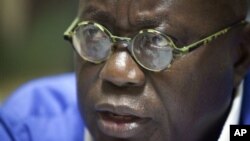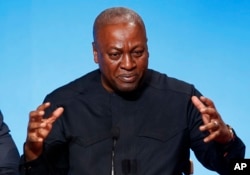Ghana's main opposition leader, Nana Akufo-Addo, skipped the country's only presidential debate Wednesday, leaving the stage to President John Mahama and four other opponents a week before the election.
Aides to the leader of the New Patriotic Party said he decided to stick to his prior campaign commitments, even though it meant missing the chance to present his message at one of the most high-profile events of the campaign.
Analysts say Akufo-Addo has a real chance of defeating Mahama or of taking the December 7 election to a second round, largely because of voter discontent over an economic slowdown since the president won the first of two possible terms in 2012.
In the absence of a large number of reliable opinion polls, politicians on all sides say they expect a tight contest.
Ghana exports gold, oil and cocoa but has suffered from a slump in global commodity prices and macroeconomic instability in the form of inflation that stood at 15.8 percent last month, an elevated budget deficit and high unemployment.
The government says the economy will recover after it increased revenues and took tough measures to limit public sector wages and spending. Some of the measures were taken as part of an aid program with the International Monetary Fund.
"We were faced with a very unbalanced economy and we have taken bold measures. ... All the macro economic indicators are pointing in the right direction," Mahama said, adding that growth would rise above 8 percent in 2017 from a projected 4.1 percent this year.
"The leader of the opposition has opted out. It is usually the opposition that is more keen to have a debate," he said in his only reference to the issue.
The debate produced few fireworks. Opposition party leaders confined themselves to explaining their own policies on issues such as education, energy and jobs, rather than launching a sustained attack on the government's record.
In one example, Papa Kwesi Nduom, leader of the Progressive People's Party and a prominent businessman, said he would change the constitution if elected to establish an independent prosecutor in a bid to combat corruption and also use his business experience to create jobs.
The debate showcased the electoral process in Ghana, one of Africa's most stable democracies. Twice since 2000, voters have turned the government of the day out of power.
Debate moderators frequently interrupted Mahama when his answers overran the allotted time limit.






